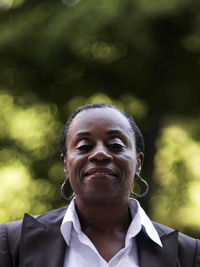"It's an important way to ensure the quality of my courses.”
Shirley Harrell
 Shirley Harrell, an assistant professor at Cambridge College, motivates her students by exposing them to MIT's academic standards. (Photo courtesy of Rana Banerjee.)
Shirley Harrell, an assistant professor at Cambridge College, motivates her students by exposing them to MIT's academic standards. (Photo courtesy of Rana Banerjee.)Stephen Carson | MIT OpenCourseWare
Shirley Harrell, an assistant professor in the School of Management at Cambridge College in Cambridge, MA, speaks with pride of the educational environment of her institution. As an open-enrollment school, she explains, Cambridge has "a gate at the end, not the beginning," and welcomes students from a wide range of backgrounds, experiences, and abilities.
This range requires a delicate balancing of student needs and academic standards — a challenge that Harrell is mindful of as she designs the four management courses that she teaches at Cambridge each year. According to Harrell, this challenge was more than a little daunting when she first began teaching. "When you come through a graduate program," she explains, "they don't really teach you to teach. There's no course that says, 'This is how you construct a graduate course in organizational theory and behavior.'"
So when Harrell first heard about MIT OpenCourseWare on a CNN feature in 2004, she was quick to visit the site. Almost immediately, OCW became a crucial reference tool for her, both for curriculum design and as a benchmark. Harrell describes OCW as a "gold standard" against which she can assess her course materials, and also track the success of her students. "I look at grading policies, reading lists, writing requirements, assignments, attendance policies, and assessment," she says. "For me, it's an important way to ensure the quality of my courses."
OCW has been especially important in her assessment of individual students' contributions to team projects. "I ran into a real difficulty with teamwork," Harrell notes. "In MIT's Organizational Processes course, they've developed rubrics whereby team members can give feedback on other team members, and the instructors can then use that as a way to gauge grading for the course. These rubrics really changed how I thought about assessment."
The process of adapting MIT materials for her students can sometimes be challenging, as Harrell readily admits — but the improvement in her students' work has more than justified that investment. And OCW can also be a motivating touchstone for the students, as Harrell explains: "The students are very focused on the quality of the education they're getting here. They want reassurance that an open-enrollment school like this can impose high standards. So sometimes I'll point out to them, very deliberately, 'These are the readings from MIT. This is comparable to what they're doing at the Sloan School.' And it really does motivate them."
We hope you’ve been inspired by this story and by OCW’s effort to meet the needs of learners eager to enhance their knowledge, lift up their communities, and change the world for the benefit of everyone. Please consider supporting our work with a donation. We’d appreciate it!